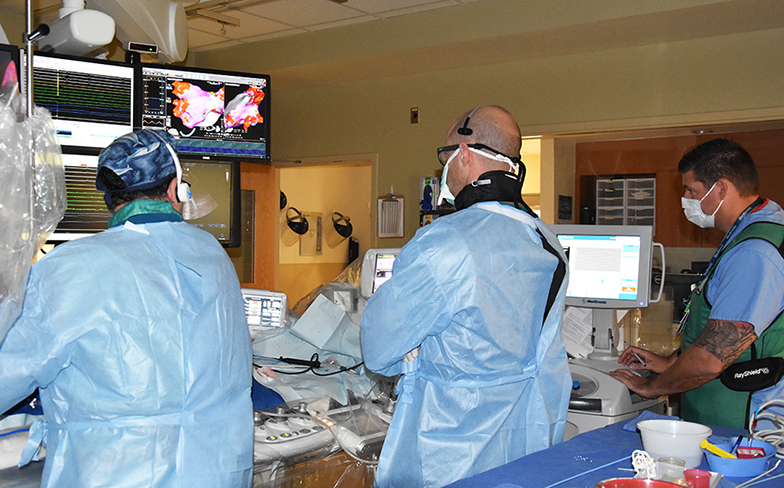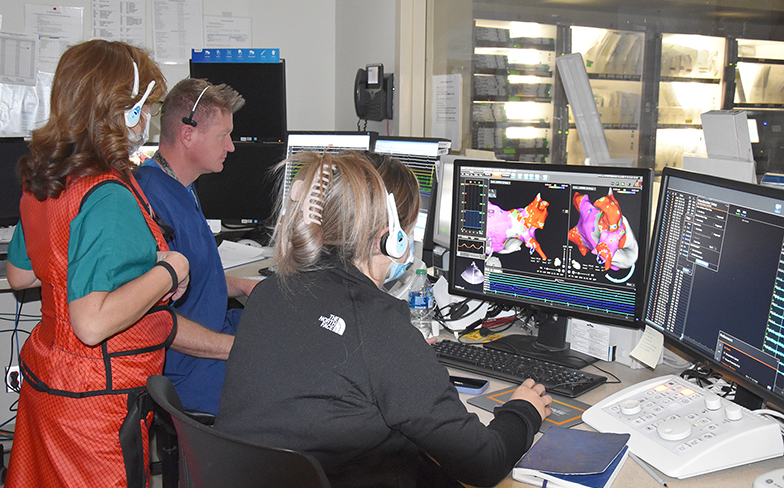San Juan Regional Medical Center is now offering a minimally invasive treatment option for some atrial fibrillation patients. Cardiac cryoablation is a treatment that effectively freezes damaged heart tissue that causes arrhythmias.
“Cryoablation is the newest of the tools that we use for what's called ablation. There are two types of ablations. One uses heat and one uses cool. The heart really likes cool rather than heat. It causes a much better lesion, and in doing so, it can help you cure arrhythmias. The main one we use it for is the most common arrhythmia in America, atrial fibrillation or AFib,” said Dr. Cary Rose, Electrophysiologist at San Juan Regional Heart Center.

Dr. Cary Rose, Electrophysiologist at San Juan Regional Medical Center performs a cardiac cryoablation procedure.
AFib is a progressive condition that affects people of all ages. The longer a person is in AFib, the worse the heart gets. This is linked to a reduced quality of life, robbing a patient of their natural heartbeat and energy, as well as heart failure, stroke and even death.
“Atrial fibrillation is an electrical cancer of the heart,” said Dr. Rose. “If you think you have AFib, get to a cardiologist immediately. Don't say, ‘oh, it'll be fine, or, oh, it's not a big deal.’ It is a big deal. It doesn't go away and it only gets worse over time.”
During a cardiac cryoablation procedure, an electrophysiologist who specializes in the treatment of irregular heart rhythms uses a special cryoballoon catheter to deliver a refrigerant to the heart. That refrigerant freezes the tissue and disables unwanted electrical signals that contribute to AFib from reaching the rest of the heart.
“The heart loves this because it results in a very nice lesion. It's not burning the heart in any way, and the heart, seems to really react very well to this. The success rate of a cryoablation procedure with something called paroxysmal AFib is estimated now between about 80 and 90 percent. This is an extremely high number. We have a real serious chance soon of maybe, hopefully curing atrial fibrillation. And that's something we all hope for,” Dr. Rose said.
Cardiac cryoablation is minimally invasive. Since it’s not a surgical procedure, recovery is quick, and Dr. Rose says patients tend to do very well.

San Juan Regional Medical Center Cath Lab team members monitor the progression of cardiac cryoablation procedure.
“There are no stitches. There is no cutting, there's no knife. You don't open a person's chest. The best part about this entire procedure is that it's similar to a heart cath, where we basically put catheters in your legs up in the veins of your legs. When we're done, we simply pull the catheters right back out, and guess what you get? You get a big Band-Aid. That's it. And then you heal up like nothing ever happened because you didn't actually have surgery,” Dr. Rose explained.
The procedure significantly reduces the risk of AFib reoccurring, and patients are much less likely to need repeat ablations. Additional benefits include an improvement in a patient’s quality of life, with unpleasant symptoms such as shortness of breath, fatigue, and weakness lessening or disappearing.
“Cryoablation is a safe and effective option to improve AFib patients’ outcomes early on before their condition progresses,” said Dr. Rose. “By treating patients with the most advanced, clinically relevant technology, we can successfully manage their condition and recurring symptoms, and make a huge difference in their lives.”
For more information on cardiac cryoablation, and if this procedure may be right for you, visit our Cardiac Cryoablation Therapy page or call San Juan Regional Heart Center at 505.609.6770.